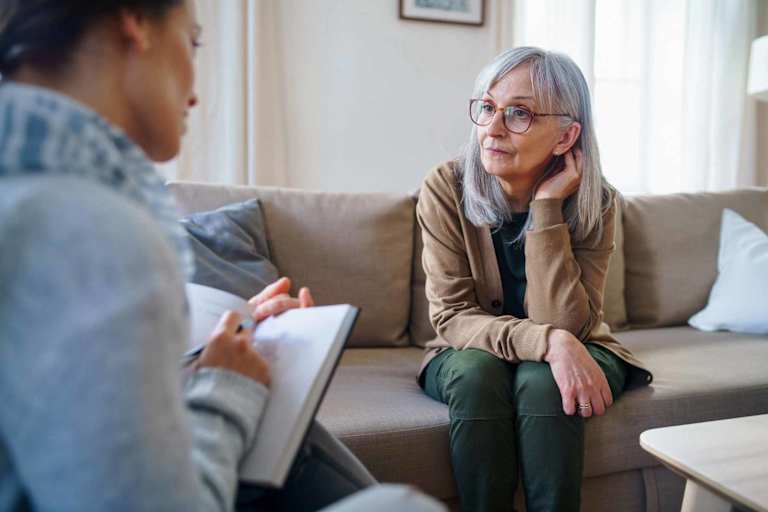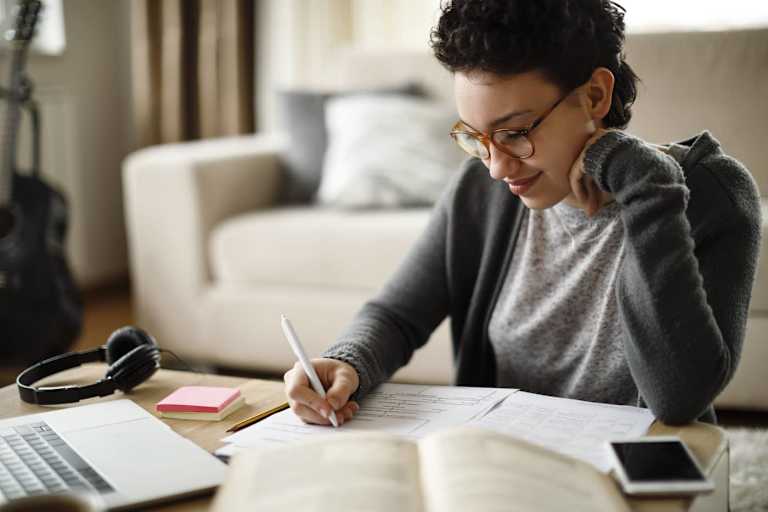How to Become a Licensed Counselor in Illinois
- Licensure Requirements
- How Long Does It Take?
- Out-of-State Licensing
- Licensure Renewal
- Salary Expectations
- Professional Organizations
- FAQ
- To become a licensed counselor in Illinois, you must complete a graduate program in counseling and meet supervision and exam requirements based on your license type.
- LPCs, LCPCs, and LMFTs must complete thousands of supervised hours to qualify for licensure in the state.
- Counselors in Illinois earn competitive salaries across specializations, with the highest wages in Chicago.
The employment outlook for professional counselors continues to grow. If you want to become a counselor in Illinois, you first need a state license. Learn about the Illinois counseling licensure process, how long it takes to get your license, and salary prospects in this guide.
Illinois Counselor Licensure Requirements
The path to becoming a licensed professional counselor in Illinois depends on your counseling specialization. The Illinois Department of Financial and Public Regulation (IDFPR) administers the licensure process for licensed professional counselors (LPCs), licensed clinical professional counselors (LCPCs), and licensed marriage and family therapists (LMFTs). School counselors must meet the qualifications established by the Illinois State Board of Education (ISBE).
Licensed Professional Counselor
Illinois licensure requirements for licensed professional counselors include:
- Master’s in counseling degree or doctorate in a related field from an accredited institution that includes a practicum or internship
- Passing score on the National Counselor Examination (NCE) administered by the National Board for Certified Counselors (NBCC)
- Submission of licensure application to the IDFPR, including a $150 application fee
The scope of practice for LPCs in Illinois does not allow for independent practice. LPCs may only provide counseling services under the supervision of an LCPC, licensed clinical social worker, psychologist, or other approved licensed provider.
Licensed Clinical Professional Counselor
Illinois licensure requirements for licensed clinical professional counselors include:
- Current, valid LPC license in Illinois
- Two years or 3,360 hours of post-graduate supervised experience, including direct counseling services
- Passing score on the National Clinical Mental Health Counseling Examination (NCMHC)
- Submission of LCPC application to the IDFPR, including a $150 application fee.
LCPC licensure applicants in Illinois typically complete both the NCE and the NCMHCE exams as part of the licensing process. However, LCPC applicants may also fulfill the exam requirement by passing the Commission on Rehabilitation Counselor Certification exam.
Unlike LPCs, LCPCs can offer clinical counseling services independently, including in private practice.
Marriage and Family Therapist
Illinois licensure requirements for marriage and family therapists include:
- Master’s degree in marriage and family therapy from a program accredited by the Commission on Accreditation for Marriage and Family Therapy Education (COAMFTE) or an equivalent program approved by IDFPR
- 3,000 hours of supervised clinical experience, including 1,000 hours of face-to-face client contact and 200 hours of supervised experience
- Passing score on the marriage and family therapy examination administered by the Association of Marital and Family Therapy Regulatory Boards (AMFTRB)
- Submission of licensure application to the IDFPR with a $100 application
After finishing an approved master’s program, an individual may qualify for temporary licensure as an associate licensed marriage and family therapist (ALMFT) without taking the AMFTRB exam. To be eligible for licensure as a full LMFT, an ALMFT must complete two years of supervised experience and pass the AMFTRB exam.
School Counselor
Illinois licensure requirements for school counselors include:
- Master’s degree in school counseling, counseling, or a related field from an accredited institution
- Minimum of 400-600 internship hours, including at least 240 hours of direct service work
- Minimum of 100 supervised practicum hours with school-aged individuals or groups, including at least 40 hours of direct service work.
- Passing score on the ISBE examination for school counselors (test code 235)
- Submission of licensure application to the ISBE with a $150 application fee
Qualified applicants receive a school counselor endorsement attached to their professional educator license. The school support personnel endorsement, allows school counselors to work with students in public schools, from preschool through high school.
How Long Does it Take to Become a Counselor in Illinois?
It takes approximately 2-4 years beyond undergraduate education to obtain Illinois counseling licensure, depending on the license type and how long it takes you to complete education requirements, supervised experience, and examinations.
Becoming an LCPC or LMFT requires approximately two years of graduate education and at least two more years of supervised experience. Becoming a school counselor requires a two-year master’s degree that integrates internship and practicum components.
Your personal timeline to Illinois counseling licensure may vary depending on whether you attend graduate school part-time or full-time.
Out-of-State Licensing Reciprocity in Illinois
Illinois does not currently have reciprocity agreements with other states. However, counselors from other states with valid licenses may apply for licensure by endorsement to practice in Illinois, if their out-of-state license and qualifications are substantially equivalent to the requirements for Illinois.
Applicants must provide documentation of education, supervised experience, and passing scores for the appropriate test for their license type.
How to Renew a Counseling License in Illinois
The renewal process for LPCs, LCPCS, and LMFTs is essentially the same. Every other year, except during their first renewal cycle, Illinois counselors must complete 30 hours of online or in-person continuing education. CE hours must be offered by an approved sponsor and include training in ethics, Alzheimer’s disease and other dementias, sexual harassment prevention, and implicit bias awareness.
School counselors must renew their licenses every five years, documenting 120 hours of professional development credits within the renewal cycle. The ISBE website provides a list of all providers authorized to issue professional development credit.
Salary Expectations for Counselors in Illinois
Illinois offers professional counselors expanding job opportunities and competitive salaries. Pay rates for counselors depend on several factors including license type and geographic location.
According to the Bureau of Labor Statistics, in May 2024, school counselors in Illinois earned an average annual salary of $69,870, making them the top-paid counselors in the state. The next highest-paid, substance use, behavioral disorder, and mental health counselors earned an average of $69,010.
Counselors employed in the state’s largest metropolitan region, which includes Chicago and its suburbs, make the most on average. School counselors in the Chicago metro area make an average of $73,930 annually, mental health counselors earn an average of $70,920, and marriage and family therapists earn an average of $68,190.
| Occupation | Average Hourly Salary | Average Annual Salary |
|---|---|---|
| Educational, Guidance, and Career Counselors and Advisors | $33.59 | $69,870 |
| Marriage and Family Therapists | $32.04 | $66,640 |
| Substance Use, Behavioral Disorder, and Mental Health Counselors | $33.18 | $69,010 |
| Counselors, All Other | $26.51 | $55,140 |
Professional Organizations for Counselors in Illinois
Illinois Counseling Association
ICA represents the interests of Illinois professional counselors through political advocacy, continuing education opportunities, and in-person networking events in locations throughout the state. Membership benefits include access to discounted legal services, and health and malpractice insurance.
Illinois Mental Health Counselors Association
Founded in 1979, IMHCA offers its members an array of resources, including licensure test preparation, information on license applications, renewal, and reciprocity, and supervision workshops. The association sponsors a mentorship program that connects new counselors with seasoned professionals.
Illinois School Counselor Association
A division of the Illinois Counseling Association, ISCA represents over 1200 school counselors and students enrolled in school counseling graduate programs. ICSA promotes professionalism and ethical practice among Illinois school counselors, advocates for legislation, and provides professional development and continuing education workshops and conferences.
Illinois Affiliation of Marriage and Family Therapists
IAMFT is the only professional organization in Illinois that advocates on behalf of licensed marriage and family therapists. IAMFT sponsors conferences, continuing education workshops, and courses and provides members with information about licensure, the regulatory process, and legislation that affects MFT practice.
Frequently Asked Questions About Counseling Licensure
No. All counselors and therapists must obtain licensure to practice in Illinois by fulfilling the appropriate educational, supervised experience and exam requirements. The IDFPR administers licenses for LPCs, LCPCs, and LMFTs. School counselors must apply for certification and the school support personnel endorsement for school counselors administered by the ISBE.



